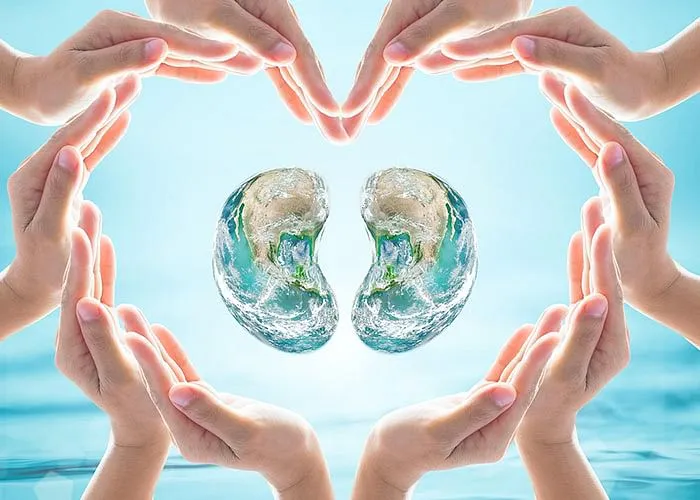World Kidney Day (WKD) is global awareness campaign of letting people know the importance of their kidneys with an aim to reduce the frequency and impact of kidney diseases. It is observed on the 2nd Thursday of March every year.
WKD began as joint initiative of the International Society of Nephrology and the International Federation of Kidney Foundation but now it has expanded to involve many renal societies, NGO’s, celebrities, governments as well as a common man. Every year a particular theme is set.
This year on 14th March we are celebrating the 14th WKD with the theme “Kidney Health for Everyone Everywhere”. This calls for universal health coverage for prevention and early treatment of kidney disease, which can be achieved by ensuring universal, sustainable and equitable access to essential healthcare of high quality, protecting people from health impoverishment and improving equity in health across socioeconomic groups. It envisages everyone to advocate for concrete measures to improve kidney care.
World over 850 million people are estimated to have kidney disease from various causes. Chronic kidney disease (CKD) causes 2.4 million deaths per year and is the 6th fastest growing cause of death. Diabetes and Hypertension are the leading causes of CKD, with the increase in the longevity and improved lifestyle these two diseases are on the rise and hence a long term reciprocal rise of CKD.
Acute kidney injury (AKI) affects over 13 million people worldwide, 85% in low and middle income countries, about 1.7 million people die annually because of AKI. In developing world infections and pregnancy related complications still continue to be the leading and preventable causes of AKI, which has been curtailed to a large extent in the developed world.
AKI & CKD are important contributors to increase morbidity and mortality for other diseases including cardiovascular diseases, diabetes, hypertension, obesity as well as infections like malaria, HIV, TB and hepatitis.
AKI which till late was known to be fully recoverable has now been implicated in causing long term consequences of indolent kidney damage in some high risk groups especially in children, elderly and those with certain chronic diseases.
CKD is an irreversible disease and in advanced stage needs dialysis and/or transplantation, besides a number of medications.
There are challenges to kidney health, disparities in management and also the access to the people affected. Despite growing burden of kidney disease world-wide, kidney health disparity and inequity are still wide spread, which is more common in low socioeconomic countries where poverty, gender discrimination, lack of education, occupational hazards and pollution are widespread.
Transplant being the most cost effective treatment form of treatment in developing world where dialysis centres are still not in number as is required. Both dialysis and transplant set up have their own issues which include high set up costs with regard to infrastructure, specialized teams, availability of organ donors and dialysis backup. Add to this the legal hassles, culture bias against organ donation and almost nonexistent cadaveric program to make the program less popular.
Scenario in Kashmir. For a population of 6 million we have only 8 qualified nephrologists which comes to almost one per million, which as per even the national standards is totally inadequate.
These specialists are limited to two hospitals of SKIMS and SMHS with few in private sector. Coming to the modalities for management of kidney diseases we do have all diagnostic and therapeutic modalities available here but lack in manpower and outreach.
We have all diagnostic backup and all the therapeutic facilities needed to manage any kidney disease. Renal replacement therapy be it dialysis or transplantation is available.
Hemodialysis facilities have grown markedly and from 2 centres available in Srinagar district in year 2000, we presently have about 30 dialysis centers available in almost all districts (except 2). Transplantation is done at SKIMS on a weekly basis and in near future the plans are to increase the number further.
What we should ask from the Authorities.
1. trainmore nephrologists and give more MD docs training in dialysis.
2. Ensurethat the national dialysis policy of ensuring hemodialysis in all districthospitals is set up.
3. Ensurethat acute PD is started at district and sub district hospitals.
4. We needto spread awareness about kidney disease regularly amongst the people as wellas the medical staff.
5. Subsidizethe hemodialysis and CAPD so that all poor patients get benefitted.
6. Appealauthorities to have free medications for kidney transplant patients, as hasbeen done by other states.
7. Set up aseparate renal sciences institute so that comprehensive nephrology and urologycare is provided under one roof.
8. Start thenephrology facility in the newly set up medical colleges.
9. Provideequitable and sustainable access to advanced renal health care services likedialysis and transplantation as well as financial protection.
10. Screeningfor kidney disease should be a priority to identify the kidney disease at theearliest so that they receive basic facilities of BP, diabetes and lipidcontrol so that the disease progression can be delayed as much as possible. Thecommunity also should lead in helping the poor and needy.
With awareness through various campaigns done on the WorldKidney Day, we can help ourselves and others to live long without any kidneyproblems. Whatever our socioeconomic status, let us strive at individual,domestic, community, institutional level to the zeal for self as well as othersfor a healthy life and healthy kidneys.
Dr Muzafar Maqsood Wani is Consultant Nephrologist, SKIMS, Soura






